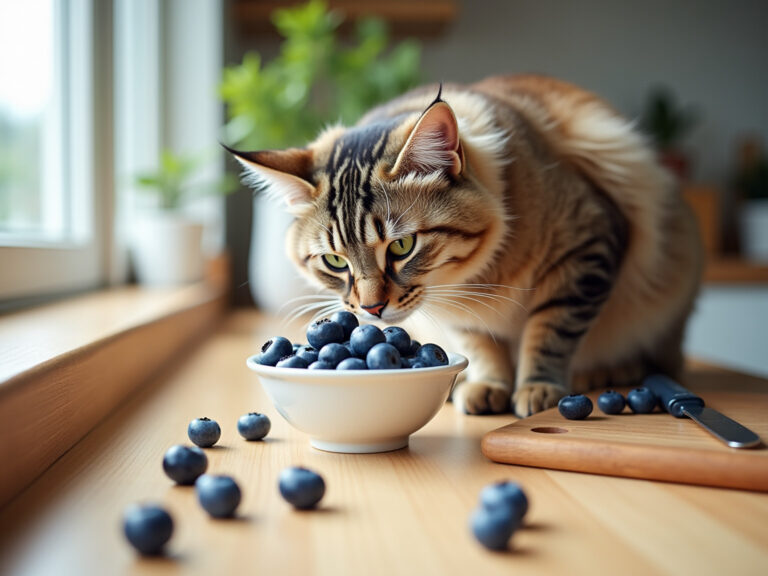Can Cats Have Blueberries? Understanding Their Safety and Benefits
Overview
As a loving pet owner, you may wonder about the best treats for your furry family members. Good news! Cats can enjoy blueberries as a safe and nutritious treat when offered in moderation. It’s essential to introduce them gradually and keep an eye out for any adverse reactions. By incorporating blueberries into your cat’s diet, you provide them with antioxidants and vitamins that can enhance their overall well-being.
However, we understand that every pet is unique. That’s why it’s crucial to consult your veterinarian regarding portion sizes, especially if your cat has pre-existing health conditions. Your pet’s health is our top priority, and we want to ensure they thrive in a nurturing environment. Remember, taking these small steps can make a big difference in your cat’s happiness and health.
Introduction
The vibrant blue hue and sweet-tart flavor of blueberries have made them a popular snack for humans. But what about our beloved feline friends? While cats are obligate carnivores, these small, antioxidant-rich berries can offer a delightful and nutritious treat when introduced properly.
As caring pet owners, it’s essential to understand the potential health benefits, safety considerations, and best practices for incorporating blueberries into your cat’s diet:
- Enhancing immune health
- Promoting digestive well-being
Blueberries can serve as a flavorful addition to mealtime—just remember to offer them in moderation. This exploration delves into the nutritional value of blueberries for your furry family members, ensuring you can make informed decisions about this unique treat.
Understanding Blueberries: Definition and Nutritional Value for Cats
Blueberries, those delightful little round fruits from the genus Vaccinium, are cherished not only for their vibrant blue hue but also for their sweet-tart flavor. These nutrient-dense berries are low in calories yet brimming with essential vitamins and minerals, such as vitamin C and vitamin K1, along with dietary fiber. Rich in antioxidants, particularly anthocyanins, these small fruits offer a multitude of health benefits.
While it’s important to remember that felines are obligate carnivores and don’t require fruits in their diet, the question of can cats have blueberries is relevant, as they can be a safe and enjoyable treat when offered in moderation. Imagine mixing these small berries with your cat’s food or other healthy treats—what a flavorful addition that might enhance mealtime enjoyment! As Audrey Halfen, a specialist in pet nutrition, wisely notes, ‘You can combine berries with your cat’s food or other nutritious treats if you wish!’
However, it’s crucial for pet owners to be mindful of portion sizes, as excessive consumption could lead to gastrointestinal issues such as stomach upset, vomiting, or diarrhea. A case study titled “Potential Health Risks of Blueberries” underscores the importance of consulting with a veterinarian about the appropriate amount, especially for cats with pre-existing health conditions.
Overall, when offered responsibly, the question of can cats have blueberries arises, as they can positively contribute to a cat’s diet, adding both nutritional value and a delightful taste experience for your furry family members.

Assessing the Safety of Blueberries for Cats: Key Considerations
A common question is, can cats have blueberries, as they can be a safe and delightful snack for your furry family members when given in moderation? It’s important to introduce them gradually, allowing you to observe any potential adverse reactions. Some cats may have allergies or sensitivities to certain fruits, so starting with a small quantity is wise. Always ensure that the berries are fresh and free from pesticides; washing them thoroughly before feeding is highly recommended. While these small fruits are not toxic, excessive consumption can lead to digestive issues. Therefore, moderation is essential—typically, offering two or three berries every few days is advisable.
Studies show that providing felines with berries can enhance their antioxidant intake, which is beneficial for their overall well-being. However, it’s crucial to consider that cats with specific medical conditions, such as diabetes, should consult a veterinarian to determine if they can have blueberries in their diet. A case study titled ‘Blueberries and Feline Health Issues‘ highlights that the elevated sugar content in blueberries may cause increases in blood sugar levels, posing risks for cats with pre-existing medical conditions. Thus, understanding your cat’s health status and dietary needs is vital when considering new foods. Always prioritize consulting a veterinarian if you are uncertain about introducing berries into your cat’s diet.
Health Benefits of Blueberries: Nutritional Components and Effects on Cats
As blueberries are truly a powerhouse of antioxidants, including vitamin C and flavonoids, which play a crucial role in combating oxidative stress, many wonder, can cats have blueberries? For those furry family members who are exposed to higher levels of pollution, suffer from chronic health issues, or are simply in their golden years, the risk of oxidative stress increases significantly. This is where the antioxidants found in these vibrant blue fruits become especially beneficial.
When considering if can cats have blueberries, it’s important to note that not only do they support immune health and help reduce inflammation, contributing to your cat’s overall well-being, but the dietary fiber in blueberries also aids digestion and promotes a healthy gut, making them a wonderful addition to your cat’s nutrition. While these fruits should complement a balanced diet rather than replace it, they bring diversity and joy to your feline companions’ meals.
Dr. Jennifer Coates, a caring veterinarian, points out that the nutrients in blueberries may also support heart health and enhance cognitive function in older cats, which raises the question: can cats have blueberries as a delightful snack for pets of any age? This insight aligns beautifully with the broader context of nutrition for pet well-being, underscoring the importance of incorporating such nourishing options into your cat’s diet.
Additionally, inspiring case studies on canine recovery through tailored rehabilitation programs highlight the vital role of nutrition and health in our pets’ lives. This emphasizes the wonderful benefits of blueberries as part of a comprehensive approach to pet care, ensuring your furry friends thrive in a nurturing environment.
Introducing Blueberries to Your Cat: Safe Practices and Portion Control
To safely introduce these small fruits to your furry family member, you may wonder, can cats have blueberries? Start with just one and closely observe their reaction. If your cat shows interest and experiences no adverse effects, you can gradually increase the quantity to determine if can cats have blueberries. It’s a good idea to cut or mash the fruit to reduce choking risks, especially for smaller cats.
Remember, treats, including other fruits, should comprise no more than 10% of your cat’s overall diet to ensure a balanced nutrition. After introducing any new food, keep a watchful eye on your cat’s health and behavior, and consult a veterinarian if any concerns arise.
As noted by Subbotina Anna, while the question can cats have blueberries arises as a delightful treat, high-protein options such as lean cooked meat or fish are generally more suitable for our feline friends. Additionally, a case study titled ‘What Is the Best Treat to Give a Cat?’ advises that high-protein snacks are preferable over fruits for their nutritional value.
Following these best practices will help ensure a safe and enjoyable experience for your beloved pet.
Conclusion
Incorporating blueberries into your furry family member’s diet can offer a variety of health benefits, from boosting immune function to supporting digestive health. These small, vibrant fruits are packed with antioxidants, vitamins, and dietary fiber, making them a nutritious treat when given in moderation. However, it’s important to approach this addition thoughtfully—start with small portions and keep an eye out for any adverse reactions.
Safety is paramount; ensure that the blueberries you offer are fresh, free from pesticides, and introduced gradually. Consulting with a veterinarian is a wise step, especially for cats with underlying health conditions, as too much can lead to digestive discomfort. By adhering to best practices for introduction and portion control, blueberries can become a delightful and healthy enhancement to your cat’s diet.
Ultimately, while blueberries can bring joy to mealtime and add nutritional value, they should complement a balanced diet focused primarily on high-protein foods. By understanding both the benefits and potential risks, you can make informed decisions that positively impact your feline companion’s health and well-being. Remember, your pet deserves the best, and with thoughtful choices, you can nurture a happy and healthy life together.
Frequently Asked Questions
What are blueberries and what nutrients do they contain?
Blueberries are small round fruits from the genus Vaccinium, known for their vibrant blue color and sweet-tart flavor. They are low in calories and rich in essential vitamins and minerals, including vitamin C, vitamin K1, and dietary fiber, as well as antioxidants, particularly anthocyanins.
Can cats eat blueberries?
Yes, cats can have blueberries as a safe and enjoyable treat when offered in moderation. However, it is important to remember that cats are obligate carnivores and do not require fruits in their diet.
How can blueberries be incorporated into a cat’s diet?
Blueberries can be mixed with a cat’s food or combined with other healthy treats to enhance mealtime enjoyment.
What should pet owners be cautious about when giving blueberries to their cats?
Pet owners should be mindful of portion sizes, as excessive consumption of blueberries could lead to gastrointestinal issues such as stomach upset, vomiting, or diarrhea.
Is it necessary to consult a veterinarian before giving blueberries to cats?
Yes, it is crucial to consult with a veterinarian about the appropriate amount of blueberries to offer, especially for cats with pre-existing health conditions.
What are the potential benefits of blueberries for cats?
When offered responsibly, blueberries can positively contribute to a cat’s diet by adding nutritional value and providing a delightful taste experience.



